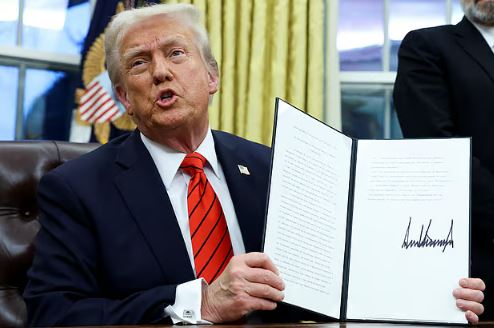The additional 37 per cent reciprocal tariff imposed on Bangladeshi exports by the administration of US President Donald Trump may be reduced.
Bilateral negotiations are currently underway, and a final decision could be reached following a meeting between Bangladesh and the United States scheduled for 29 June, reports Prothom Alo.
In the meantime, Bangladesh is proactively increasing its bilateral trade with the US. As part of efforts to encourage the US to lower the reciprocal tariff rate, the government is preparing to import 300,000 tonnes of wheat at a higher cost through a government-to-government (G2G) deal.
An initial decision to this effect was taken at a G2G-related committee meeting held at the Secretariat on Thursday, chaired by Food Secretary Masudul Hasan.
In addition, the Ministry of Civil Aviation and Tourism is taking steps to purchase aircraft from US-based Boeing. Bangladesh is also simplifying the process of importing cotton from the United States.
These developments have been confirmed by sources within the Ministry of Food, Ministry of Commerce, and Ministry of Civil Aviation and Tourism. The sources indicated that if the upcoming 29 June talks are successful, the reciprocal tariff rate may be revised downward.
Currently, Bangladesh exports goods to the United States at an average tariff of 15 per cent. However, on 3 April, the Trump administration unexpectedly announced an additional 37 per cent reciprocal tariff, raising the total tariff to 52 per cent.
This was set to take effect from 9 April. On that day, however, the US suspended the implementation of the new tariff on Bangladesh—along with other countries—for a period of three months. That suspension is due to expire on 9 July.
Asked about the decision to import wheat from the United States, a senior official from the Ministry of Food stated that Bangladesh typically imports wheat from Russia and Ukraine, where prices are relatively lower.
Despite this, the government has decided to proceed with US wheat imports at a rate that is USD 20 to USD 25 per tonne higher. The shipping cost from the United States is also higher. However, officials say that US wheat is of higher quality.
Bilateral Discussions Underway
It has been learned that some of the demands made by the United States are based on its own domestic laws and are not applicable under Bangladeshi law. As a result, letters have been exchanged between the two countries to address these differences. A meeting was held in the United States at 6:30 pm Bangladesh time yesterday, where Khalilur Rahman, security adviser to the chief advisor, participated. However, the outcome of the meeting was not immediately known as of last night.
Sources at the Ministry of Commerce said that Bangladesh is currently ahead of other countries engaged in bilateral talks with the United States regarding the reduction of the reciprocal tariff rate. Some countries, such as Indonesia, have stalled at certain stages of discussion. However, senior officials at the Ministry of Commerce remain hopeful that US President Donald Trump may decide to extend the suspension of the reciprocal tariff for another year.
According to data from the US Census Bureau, Bangladesh’s exports to the United States have increased by USD 2.5 billion over the past decade. Meanwhile, imports from the United States have grown by USD 1.25 billion. In 2024, Bangladesh exported goods worth USD 8.36 billion to the US, while importing goods worth USD 2.21 billion, resulting in a trade surplus of USD 6.15 billion in Bangladesh’s favour.
When asked about the overall situation, Selim Raihan, Executive Director of the South Asian Network on Economic Modeling (SANEM), told Prothom Alo, “Bangladesh has taken several initiatives, which are positive from the perspective of the United States. However, we will have to wait until that day to see what happens after 9 July.”
Other Measures
On 7 April, Chief Advisor Professor Muhammad Yunus sent a letter to US President Donald Trump, requesting a three-month postponement of the reciprocal tariff decision. The letter stated that Bangladesh imposes the lowest tariff on US products in the South Asian region. It also mentioned that zero tariffs would continue on US agricultural products and scrap materials. Additionally, Bangladesh is considering a 50 per cent tariff reduction on major US exports such as gas turbines, semiconductors, and medical equipment.
On the same day, Trade Advisor Sheikh Bashiruddin met with officials at the US Embassy in Dhaka in the morning and later sent a separate letter to US Trade Representative (USTR) Ambassador Jameson Greer. In the letter, he noted that Bangladesh currently imposes no tariffs on 190 products and is considering adding 100 more items to the duty-free list. Bangladesh, he emphasized, has always upheld a policy of constructive dialogue and cooperation and is willing to remove any barriers to US exports.
Even after President Trump suspended the reciprocal tariff for three months, several rounds of direct and online meetings and correspondence between the two countries continued. Bangladesh held a meeting with the USTR in Washington on 21 April, during which the US sought clarification on six issues. These were addressed in a follow-up letter sent on 4 June. A draft of the reciprocal tariff agreement was then prepared on 12 June, followed by an online meeting held on 17 June.
Regarding the matter, Commerce Secretary Mahbubur Rahman told Prothom Alo, “The draft is confidential and cannot be published anywhere. Therefore, we are handling the negotiations ourselves.”













-20260226080139.webp)






-20260225072312.webp)








-20260219054530.webp)
-20260224075258.webp)




-20260221022827.webp)